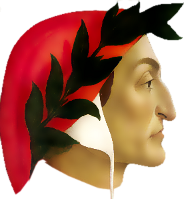
Dante Alighieri's portrait by Sandro Botticelli.(Photo credit: Wikipedia)
Interested in learning Italian language? There are so many things to discover and learn in this wonderful idiom, but we have to take the learning one topic at a time. And to share one of the numerous topics to effectively learn language like this, let’s go the phrases. Various Italian phrases are commonly stated by common people, and the following below are fifty of the longest lists of Italian phrases along with other quotes, mottos, and words.
- A buon intenditor poche parole – Few words (are sufficient) for the good listener
- A chi fa male, mai mancano scuse – Who does evil, is never short of excuse
- A nemico che fugge, fa un ponte d’oro – Make a golden bridge for a fleeing foe
- A poco a poco – By little and little
- A prima vista – At first sight
- A vostro comodo – At your leisure, at your convenience
- Ad ogni santo vien sua festa – Every saint has his own festival
- Ai mali estremi, mali rimedi – For severe ills, severe remedies
- Aiutati che Dio ti aiuta – Helf yourself and God will help you
- Al fine – To the end
- Al fresco – In the fresh, in the open air
- Altro che! – Certainly; I should think so
- Amor e signoria non vogliono compania – Love and lordship like no fellowship
- Amor non conosce travaglio – Love never tires
- Amor regge senza legge – Love rules without laws
- Amor tutti fa uguali – Love makes all men equal
- Amore è cieco – Love is blind
- Anno di neve, anno di bene – A snow year, a rich year
- Assai ben balla a chi Fortuna suona – He dances well to whom Fortune pipes
- Badate a’ fatti vostri! – Mind your own business!
- Bella cosa far niente – Idleness is a nice employment (a beautiful thing)
- Bella cosa tosto è rapita – A pretty thing is soon taken
- Belle parole non pascon i gatti – Fine words don’t feed cats
- Bene placito – At pleasure
- Bravissimo – Exceedingly well done
- Breve orazione penetra – God listens to short prayers
- Capo d’anno – New Year’s Day
- Capo d’opera – A masterpiece
- Cavaliere errante – A knight errant, a tramp
- Cavallo que corre non ha bisogno di sproni – Do not spur the willing horse
- Cercare il pelo nell’ uovo – To seek the hair in the egg, to pick faults where there are none.
- Che ‘l perder tempo a chi più sa più spiace – Loss of time most grieveth him who knoweth most (Dante)
- Che non men che saver, dubbiar m’aggrata – Ignorance not less than knowledge charms (Dante)
- Chè per vendetta mai non sanò piaga – Revenge never healed a wound (Guarini)
- Che sarà sarà – What is to be, will be
- Che talor cresce una beltà un bel manto – Fine clothes often make beauty still more beautiful (Ariosto)
- Chi ama, crede – He who loves, trusts
- Chi be vive, ben muore – A good life makes an easy death
- Chi bestia va a Roma bestia ritorna – He that goes to Rome a foot returns a fool
- Chi cerca mal, mal trova – He who looks for evil generally finds it
- Chi ha l’amor nel petto, ha lo sprone a’fianchi – He who has love in his chest, has spurs in his sides
- Chi la dura la vince – He who perseveres wins at last
- Chi lar dura la vince – He that endureth overcomes
- Chi non fa, non falla – He who does nothing makes no blunders
- Chi più sa, meno parla – He who knows most, talks least
- Ciò che Dio vuole, Io voglio – What God wills, I will
- Corre lontano chi non torna mai – He runs far who never turns
- Così fan tutte – That is the way of all women
- Così fan tutti – That is the way of the world
- Cui niente sa, di niente dubita – Who knows nothing, doubts nothing
